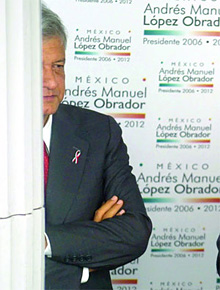 |
 |
 |
 Editorials | September 2006 Editorials | September 2006  
It's the Poverty: Close Mexico's Wealth Chasm
 Stephen Zamora - Newswire Stephen Zamora - Newswire


| | In a country plagued by economic inequality, Andrés Manuel López Obrador's platform of "economic justice for all" strikes a resounding chord, and the perredistas have always seen more cause for hope in Obrador than they do in Felipe Calderón. (Ariel Álvarez) |
Economic equity is last step toward political stability

Money, or more precisely the lack of it, is the simple reason why many in Mexico will continue to resist the election of Felipe Calderón as their next president.

"Perredistas," as the supporters of losing candidate Andrés Manuel López Obrador are called, mourned last week's news that the Mexican Federal Electoral Tribunal had ratified Calderón's victory and immediately vowed to continue protesting the election results. In a country plagued by economic inequality, Obrador's platform of "economic justice for all" strikes a resounding chord, and the perredistas have always seen more cause for hope in López Obrador than they do in Calderón.

The protests in Mexico have been building for decades, and are fueled by two principal factors: a legacy of deep distrust and cynicism that lingers after 70 years of one-party rule, and widespread poverty and economic injustice.

Distrust of the political system is understandable, but misplaced. Mexico today is no longer a "perfect dictatorship," the term that Peruvian writer Mario Vargas Llosa coined to describe Mexican government. Electoral fraud and corruption were commonplace during the single-party "democracy" that prevailed from 1929 to 2000. But over the past 18 years' three presidential terms, Mexico has successfully completed more economic and political reforms than any other country in the world.

The most significant reforms began with the presidency of Carlos Salinas de Gortari (1988-1994). Salinas ushered in the new era of economic openness, replacing trade barriers and central economic control with open markets, but he left the aging political apparatus in place. President Salinas' hand-picked successor, President Ernesto Zedillo (1994-2000), extended Salinas's economic openness to the political sphere. Through constitutional and legal reforms, Zedillo revamped Mexico's electoral laws and strengthened the judiciary. The reforms were so successful that in 2000 the PRI, the party that had ruled Mexico for 71 years, lost its first presidential election.

The opposition leader elected in 2000, President Vicente Fox (2000-2006) has lacked the support in Congress to pursue major reforms, but the electoral system that brought him into office in 2000 is the same one that elected Felipe Calderón in 2006. This is the same electoral system that officials from Iraq's Coalition Authority inspected when they were seeking a model for Iraq's first free elections. Unlike the United States, which the Iraqis chose to ignore as a model, perhaps because of the Bush-Gore debacle in Florida, Mexico's system has a built-in independent electoral tribunal that is relatively insulated from political influence. That group is the Federal Electoral Tribunal, which ratified Calderón's election.

To a greater extent than at any time in its history, Mexico can properly boast of being governed by the rule of law, rather than by political machinations and demagoguery. The protests in support of López Obrador, or AMLO as he is known in Mexico, are an outdated reflection of the country's authoritarian past, but hopefully not a harbinger of Mexico's future. His efforts to disregard the electoral laws threaten to undermine the rule of law that Mexico has worked so hard to reinforce.

The root of these protests and their legitimacy, if there is any, lies in the intransigent economic injustices that characterize Mexican society. According to the World Bank, half of all Mexicans live in poverty, and one-fifth suffer extreme poverty.

President Salinas reformed the economic system, President Zedillo reformed the judicial and electoral systems, but neither made significant headway in addressing the coexistence of extreme wealth and extreme poverty in Mexico. Since Mexico's entry into NAFTA, wealthy Mexicans have prospered inordinately, while a majority of Mexicans remain mired in poverty. Modern Mexico boasts Mercedes-Benz and Ferrari dealerships, but every year thousands of poor Mexicans risk illegal entry into the United States because they can't earn a decent wage at home.

The final cornerstone in the construction of a stable democracy in Mexico — the removal of this profound chasm between the rich and poor — will be the hardest to achieve, and Mexico's leaders in business as well as government can be equally faulted for not addressing it properly. In recent weeks, President-elect Felipe Calderón has spoken of the need to solve Mexico's endemic poverty, just as his predecessors have done. Once he takes office, he must follow these pronouncements with actions — a daunting task for a president who garnered one-third of the votes cast, and whose political party lacks a majority in Congress. One can only hope that other political leaders will support him in this, since a stable democracy in Mexico depends on it.

Zamora is the Leonard B. Rosenberg Professor of Law at the University of Houston Law Center and is the lead author of the treatise Mexican Law published by Oxford University in 2004. | 
 | |
 |



